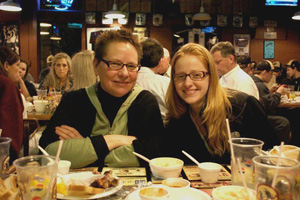Stefanie Mircovich ’10 writes about her experiences on Alternative School Break Club’s Civil Rights Tour
 Stefanie Mircovich ’10 (Wyckoff, N.J.), a double major in American studies and anthropology & sociology, served as team leader for Alternative School Break Club’s Civil Rights Tour March 13-20. Along with Bonnie Winfield, director of the Landis Community Outreach Center, and eight other students, Mircovich visited locations in Knoxville, Tenn., Birmingham and Montgomery, Ala., and Atlanta, Ga., to learn about the Civil Rights Movement in the exact locations where historical moments occurred.
Stefanie Mircovich ’10 (Wyckoff, N.J.), a double major in American studies and anthropology & sociology, served as team leader for Alternative School Break Club’s Civil Rights Tour March 13-20. Along with Bonnie Winfield, director of the Landis Community Outreach Center, and eight other students, Mircovich visited locations in Knoxville, Tenn., Birmingham and Montgomery, Ala., and Atlanta, Ga., to learn about the Civil Rights Movement in the exact locations where historical moments occurred.
The first night of the Alternative Spring Break (ASB) Civil Rights trip started with a collective drawing of a stick figure. This stick figure was intended to represent the ideal characteristics of an individual about to embark on a Civil Rights Tour. The stick figure had an open-mind, a caring heart, and a smile among other characteristics, but I think the most important part of the drawing was the road the stick figure was travelling. There was a past, present, and future to this road that, looking back, really embodies the course of the trip.
First, our team had to learn about the past, starting in Africa where future American slaves thrived in a rich African culture. This past also included both general facts and personal stories about such topics as the slave trade, slavery, the Civil War, the Jim Crow laws, the Civil Rights Movement, and acts of discrimination based on race, sex, sexuality, and other identities in the later half of the 20th century and into the 21st century. From the past, we learned that civil rights are not a black-white issue; civil rights are an issue of privilege. Certain people are born with certain identities that have historically given them what author and activist Peggy McIntosh terms as the “invisible backpack” of privileges in society.
I think the most transforming part of the trip for our team was collectively understanding that past discrimination still exists in American society. This may seem obvious to some people, but as a group of mostly privileged white Lafayette students, many of us never had to think about our race, social class, or any other characteristics we have as identities that are disadvantageous.
We participated in a privilege walk at the YWCA in Birmingham, Ala., that really transformed our way of thinking from who is disadvantaged in American society to who is advantaged. Some of us were surprised by how privileged we were, but I think most of us walked away from that activity with some level of guilt. Guilt for having the opportunity to attend college, having two-parents in our homes, never having to rely on housing benefits, seeing our race positively represented in the media, or even just having our parents or teachers tell us how beautiful or smart we are.
As a group, we discussed what we could do with this guilt. We could either be ignorant about our privilege, feel guilty for the privilege we were born into, or we could change ourselves and the society around us and attempt to bring those without privilege up to the level of those with privilege.
We agreed on the third option. With inspiration from so many individuals we learned about in museums and discussions on our trip, we realized that we have the power to fight discrimination individually and work to change American social institutions in the future. On a personal level, for example, we could decide to fight discrimination by how we treat others, who we vote for in elections, or what careers we choose. On a larger scale, we could organize or become part of organizations that fight discrimination on larger societal levels.
The main lesson I learned from the Civil Rights trip was that Martin Luther King and Rosa Parks did not fight racism alone. There were many heroes in the Civil Rights Movement, ordinary people individually deciding to do extraordinary things. Everyone does not need to be a hero; common people just need to have a passion for change.
 Stefanie Mircovich ’10 (Wyckoff, N.J.), a double major in American studies and anthropology & sociology, served as team leader for Alternative School Break Club’s Civil Rights Tour March 13-20. Along with Bonnie Winfield, director of the Landis Community Outreach Center, and eight other students, Mircovich visited locations in Knoxville, Tenn., Birmingham and Montgomery, Ala., and Atlanta, Ga., to learn about the Civil Rights Movement in the exact locations where historical moments occurred.
Stefanie Mircovich ’10 (Wyckoff, N.J.), a double major in American studies and anthropology & sociology, served as team leader for Alternative School Break Club’s Civil Rights Tour March 13-20. Along with Bonnie Winfield, director of the Landis Community Outreach Center, and eight other students, Mircovich visited locations in Knoxville, Tenn., Birmingham and Montgomery, Ala., and Atlanta, Ga., to learn about the Civil Rights Movement in the exact locations where historical moments occurred.